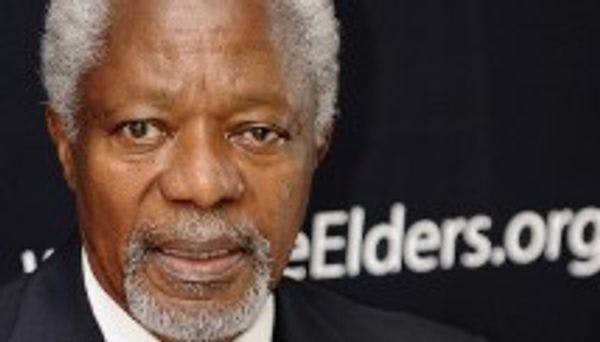Former UN Secretary-General and former President of Brazil call for fresh approaches in advance of historic global summit on drug policy
Former UN Secretary-General, Kofi Annan, and former President of Brazil, Fernando Henrique Cardoso, members of the Global Commission on Drug Policy, Call for Fresh Approaches in Advance of Historic Global Summit on Drug Policy
London, UK – In advance of a historic United Nations summit to review the international drug control system, the former UN Secretary-General, Kofi Annan, and the former President of Brazil, Fernando Henrique Cardoso, on behalf of the Global Commission on Drug Policy, highlight the failure of current strategies in a groundbreaking op-ed and encourages leaders to “change course.” The statement comes out as member states meet in Vienna this week at the UN Commission on Narcotic Drugs to agree on the process on the run up to a UN General Assembly Special Session (UNGASS) on drugs scheduled for 2016.
The piece published by CNN, states: “Each year, hundreds of thousands of people die globally from preventable drug-related disease and violence. Millions of users are arrested and thrown in jail. Communities all over the world are blighted by drug-related crime. Citizens see huge amounts of their taxes spent on harsh policies which are not working…
…All countries will have an opportunity to review the international drug control regime in a few years’ time. There will a special session of the United Nations General Assembly in 2016, which will provide a great opportunity for an honest and informed debate on drug policy. Hopefully from that debate will flow drug policies informed by evidence of what actually works in practice rather than what ideology dictates in theory. This opportunity must not be lost.”
The landmark UNGASS summit on drugs was originally scheduled to take place in 2019, but has been brought forward to 2016 at the insistence of Latin American leaders who expressed their frustration with the failure and counterproductive nature of existing drug control structures. It follows an unprecedented review of the international drug control system last May by the Organization of American States. The scenarios report published by the OAS was the first time any major multilateral agency has given a serious and detailed visualization to alternatives to prohibition including legal market regulation or reform of the UN drug conventions. The perspective of the 2016 summit also reflects the gathering momentum for substantive drug policy reforms, including on-going national and local efforts to decriminalize or regulate drugs.
“The calls for a new international approach to drugs are growing exponentially, and are coming from a range of voices: politicians, academics, economists, law enforcement officials, people who use drugs, health workers and human rights advocates. The current approach sought to reduce the supply and use of drugs, and has quite simply failed to do either. Instead, the UN itself acknowledges that their drug policies have led to serious unintended consequences – a huge black market, gang-related violence, HIV and other harms among people who inject drugs, and wide-scale human rights violations. 2016 is the right time to change direction and follow the evidence, rather than rhetoric”, said IDPC Executive Director Ann Fordham.
CONTACT: Ann Fordham, International Drug Policy Consortium (IDPC), afordham@idpc.net, +44(0) 79 7003 4810
Topics
Regions
Related Profiles
- Global Commission on Drug Policy
- International Drug Policy Consortium (IDPC)
